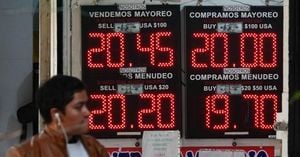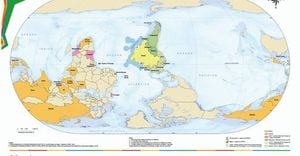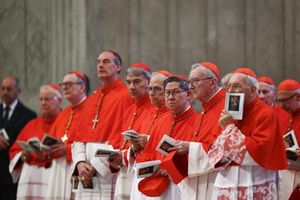Ahead of the presidential debate scheduled for May 12, 2025, organized by TVP, TVN, and Polsat, a significant controversy has erupted regarding the choice of moderator. Most campaign staffs have expressed strong opposition to Dorota Wysocka-Schnepf co-moderating the debate, citing her history of bias and unprofessionalism.
The issue came to light when Stanowski, a prominent commentator, recorded a discussion between representatives of the campaign staffs and TVP representatives on his phone. During this conversation, which took place on April 29, 2025, TVP representatives assured the campaign staffs that they would send information regarding the reported protest against Wysocka-Schnepf by April 30, 2025, at 12:00 PM. However, as of May 7, 2025, no email had been received, leading to accusations that TVP had failed to uphold its promise.
Stanowski took to social media to voice his frustration, stating, "29 kwietnia przedstawiciele TVP poinformowali sztaby wyborcze kandydatów na prezydenta, że do 30.04 do godziny 12:00 wyślą informację w sprawie zgłoszonego protestu (8 komitetów na 11 obecnych), w związku z debatą. Oczywiście było to kłamstwo, jest 7 maja i żadnego maila nie ma," which translates to, "On April 29, representatives of TVP informed the presidential candidate campaign staffs that they would send information regarding the reported protest (8 out of 11 committees present) by April 30 at 12:00 PM. It was obviously a lie; it is now May 7, and there is no email."
The debate's potential moderator, Wysocka-Schnepf, is a prominent figure in Telewizja Polska (TVP) following its takeover by the Civic Coalition. She has faced widespread criticism for her perceived extreme bias and lack of professionalism. Critics recall multiple instances where her behavior during political debates raised eyebrows, including a notable incident where she attempted to drown out a participant with a cell phone alarm.
Public sentiment surrounding the debate has been mixed. Some users on social media expressed skepticism about the situation, commenting on Stanowski's claims. One user remarked, "Grają na przeczekanie. Pani Dorota poprowadzi debatę. Z Wami czy bez Was. Tak to niestety wygląda," which translates to, "They are playing for time. Ms. Dorota will lead the debate. With you or without you. That’s how it looks, unfortunately." This sentiment reflects a growing concern that Wysocka-Schnepf's involvement could overshadow the debate's integrity.
Another user expressed a more cynical view, stating, "To akurat mnie cieszy. Im większa awantura tam będzie, im bardziej kompromitująco zachowa się prowadząca, tym lepiej. Trochę tylko Polski szkoda, ale w sumie," translating to, "This actually pleases me. The bigger the scandal there will be, the more disgraceful the host behaves, the better. It’s just a pity for Poland, but in the end." This comment underscores a belief that a controversial debate could lead to greater public engagement, even if it tarnishes the event's reputation.
As the debate approaches, the tension between the campaign staffs and TVP only seems to escalate. Stanowski's recording and the subsequent social media reactions have highlighted the deep divisions within the electoral process. The campaign staffs are demanding accountability and transparency from TVP, while the network appears to be steadfast in its decision to proceed with Wysocka-Schnepf as co-moderator.
The implications of this controversy extend beyond the debate itself. With presidential elections looming, the choice of moderator could influence voter perceptions and the overall tone of the electoral discourse. If Wysocka-Schnepf's alleged bias is perceived as a factor in the debate, it could lead to further polarization among voters, potentially impacting election outcomes.
In the context of Poland's political landscape, the debate is not just a platform for candidates to present their policies but also a reflection of the media's role in shaping public opinion. The involvement of a controversial figure like Wysocka-Schnepf raises questions about the media's responsibility to provide fair and balanced coverage, especially during critical electoral moments.
As the debate date draws closer, all eyes will be on TVP and the choices it makes regarding moderation and transparency. The outcome of this situation will likely set a precedent for how future debates are conducted and how media organizations engage with political processes.
This unfolding drama serves as a reminder of the power dynamics at play in media and politics, where the choices made by a few can resonate with many. The public's reaction to these developments will be crucial in shaping the narrative heading into the elections.




